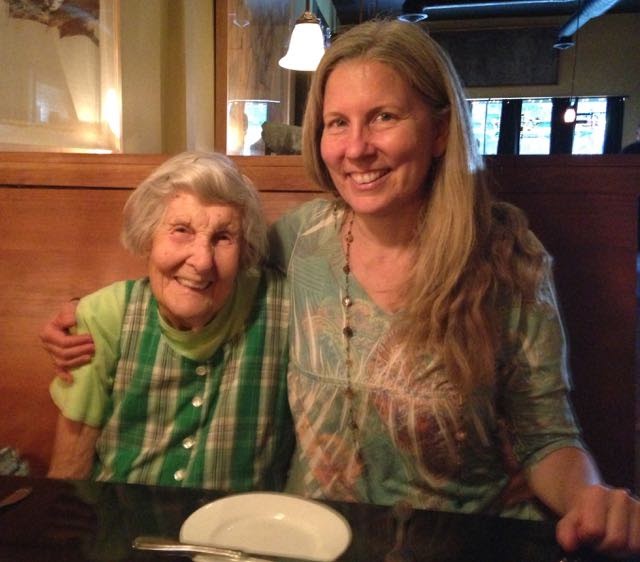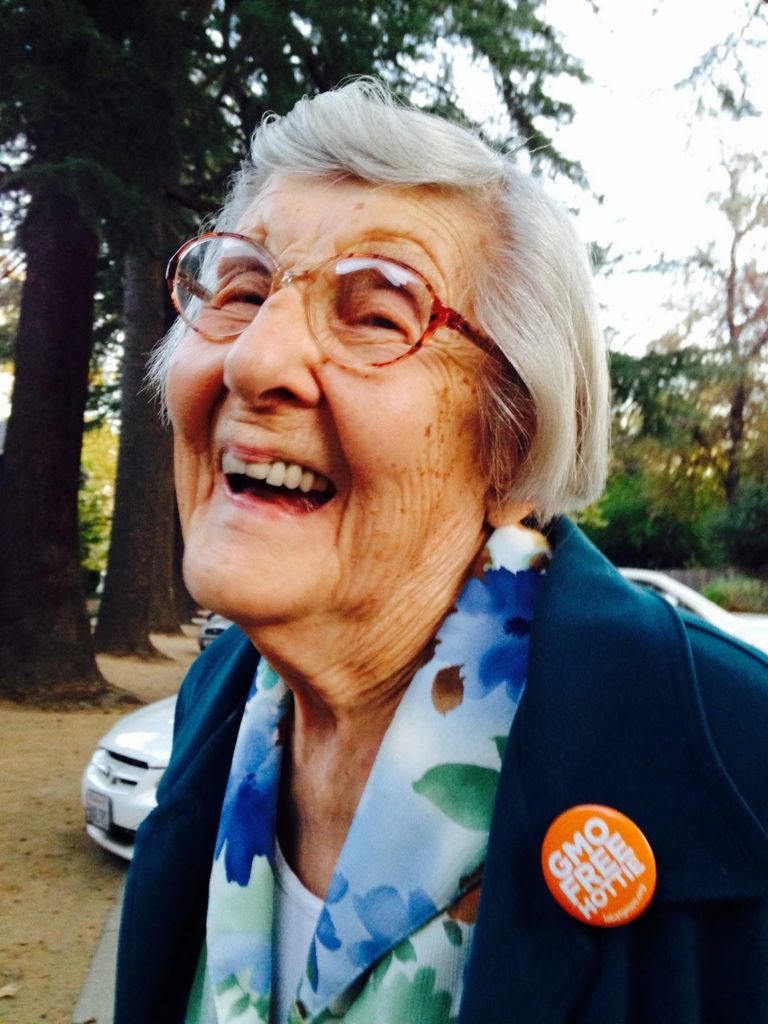October, 14 2020
Last month, my 96-year-old mother, Joan Szabo, passed away peacefully. After a few days of hospice in my sister Kanaka’s home, we watched her take her last breaths.
Kanaka and I wanted to express our love and respect for her in this sacred moment, so we played a CD of sanskrit chants that we had sung with my mother for years, and then carefully bathed her body in scented water. We dressed her in a white sweater embroidered with big, glorious, pink flowers, and an elegant black skirt. We covered her with fresh rose petals and purple blossoms from the garden.
Our older sister, Marta, was in upstate New York, so we sent her video texts explaining each stage of the process. She wanted to see everything and be as fully present as she could. Three daughters found a way to be together in this crucial time.
It was comforting to keep our mother’s body with us for another 24 hours so that we had time to sit and talk with her, to express our gratitude, and to pray and meditate by her side.
I heard that honoring the dead with loving, personal care eases the transition for those left behind, and I found that to be true. Someone said they were surprised that ‘they let us do all that’. But when you have a home death, you have the freedom to honor your beloved’s body in the way that feels right to you.
Thousands of generations of our ancestors knew what to do when someone dies, so even though we had no training or traditions to guide us, we trusted our instincts. I am especially thankful that we had this opportunity because I recognize that not everyone can do these tasks and that some deaths are more difficult.
(If you would like more information about caring for your recently deceased loved ones, I suggest this website: https://sacredcrossings.com/mission/)

These past few weeks I’ve reflected on my experience of receiving a powerful maternal love. I admit that when I was young I wanted a different kind of mother – someone who could soothe my tears and offer words of affirmation. My mother had other gifts to offer.
She was incredibly steady in her care for us over five to six decades. She spoke the language of love of so many mothers: through the preparing and serving of thousands and thousands of nourishing meals. Wherever her home was, it was our sanctuary from hectic lives, where we could see the familiar trinkets from our childhood, and sit to drink tea or coffee together. My two sisters and I knew that we were precious to her.
After my mother finally retired at age 84, she moved to California and lived near me. I discovered how much people are delighted to see a very elderly woman out and about. They would step to the side of the food coop aisles and smile broadly at her wrinkled and wizened form as she walked by. I felt like I was escorting royalty. Once while dining out, a mystery person paid for our entire bill, and I know it was because they were moved by the sight of my very old mother. I learned that even though the larger society turns away from the aged, as humans we naturally recognize the preciousness of our elders.
I have my moments when I am very sad, when I miss the way she said my name. There are other moments where I feel her spiritual presence on the vast horizon, tenderly encircling me with the joy of her freedom and her love of the earth.
If I am a little slow in getting back to you, you will know why. Nevertheless, I am always happy to hear from you and I’m grateful for the sweet condolence messages that I’ve received. Thank you!
I’d love to leave you with a few of the things I was blessed to learn from my mother – check it out below.
With love,
Anasuya
A few lessons from my mother
Taste the leaves
My earliest memories were of following behind my tall (5’10” in her youth) mother on walks. We were like a doe and fawn pair passing through woods and meadows. She would reach up and pull a Spring leaf off a tree and chew on it. I would taste it too. She taught me to be careful with shiny red berries, and to spit out anything that made my tongue numb. More importantly, she instilled in me a level of comfort and confidence in the outdoors and an appreciation for the change in seasons that gives me such pleasure to this day.
Fill your fridge with vegetables (and eat them)
My mother enjoyed her one bedroom apartment in a senior complex but often remarked that her neighbors had many health problems and could barely walk. She described the potlucks full of processed foods and sweets, and purposefully contributed vegetables and salads instead. This was appreciated. Until her early nineties, my mother kept a vegetable garden and walked a mile to get her groceries and then wheel them home in a cart. When I opened her fridge it was full of broccoli, chard and green beans. Her first thought in planning a meal was what veggies to prepare and enjoy.
Talk to strangers
My mother always talked to whoever was at hand. She told jokes to store casiers, chatted with the homeless men on the street corner, and held conversations with those she met on the bus. As a teen I was mortified by this behavior and silently pleaded with her to stop, but, as an adult, I found myself doing the same thing. I realized how entertaining, heartwarming and educational it can be to connect with all kinds of people, and I notice my sisters also talk to strangers with great ease and curiosity.
Here’s the joke that my mother told to the food coop cashier not too long ago.
“What do you put in a lovers’ salad?”
Lettuce alone without dressing.




Anasuya,
Sorry you lost your mom.
She was a fine lady.
I had affection for her.
G
She was fond of you too. My older sister inherited the beautiful paintings by you that my mother enjoyed for many years.